Essentials of Consideration: Understanding the Backbone of Contracts
Welcome to our comprehensive guide on the essentials of consideration, the backbone of contracts. Whether you are a law student studying for the SQE exams or a legal professional looking to refresh your understanding, this article will provide you with the knowledge you need to navigate the intricacies of consideration in contract law.
What is Consideration?
Consideration is a fundamental concept in contract law. It refers to something of value that is given or promised by one party to another as part of a legally binding agreement. Consideration is an essential element of a valid contract as it ensures that both parties have bargained for something in exchange for their promises.
In contract law, consideration can take various forms. It can be a promise to perform an act, the performance of an act, or the forbearance to do something. For example, if Party A promises to sell their car to Party B in exchange for a specified amount of money, the car and the money are considered the respective considerations of the parties.
The Three Essentials of Consideration
In order for consideration to be valid, it must meet three key essentials:
1. Legal Value
The consideration given by each party must have legal value. This means that the consideration should be something that is recognized by law as being capable of creating a legal obligation. For example, a promise to pay a certain sum of money or the performance of a specific act would have legal value.
However, there are certain exceptions where consideration may not have legal value, such as if it is illegal or against public policy. These exceptions should be carefully evaluated in the context of specific contracts to determine the enforceability of the consideration.
2. Bargained-for Exchange
Consideration must involve a bargained-for exchange between the parties involved. This means that each party must give or promise something of value in exchange for the other party’s consideration. The concept of mutual consideration ensures that both parties have intentionally entered into the contract with the expectation of receiving a benefit or incurring a detriment.
Without a bargained-for exchange, the contract may lack the element of legal enforceability. The intent to create a legally binding agreement must be demonstrated through the exchange of consideration between the parties.
3. Adequacy of Consideration
In contract law, the adequacy of consideration is generally not scrutinized by the courts. As long as there is some consideration present, courts do not typically inquire into whether the consideration is of equal value. This principle, often summarized by the Latin phrase “ex nihilo nihil fit” or “nothing comes from nothing,” allows individuals to freely negotiate and enter into contracts based on their own subjective assessments of value.
However, there are certain situations where the adequacy of consideration may be relevant, such as cases involving fraud, duress, or unconscionability. In these situations, the courts may examine the fairness of the transaction and consider whether one party has taken advantage of the other’s lack of bargaining power.
Conclusion
Understanding the essentials of consideration is crucial for anyone dealing with contracts. Whether you are preparing for the SQE exams or working in the legal profession, a strong grasp of consideration is essential for effectively advising clients and resolving contract disputes.
For more resources and study materials related to contract law and the SQE exams, please check out the following articles:
- SQE 1 Practice Exam Questions
- SQE 1 Practice Mocks FLK1 FLK2
- SQE 2 Preparation Courses
- SQE 1 Preparation Courses
- SRA SQE Exam Dates
We hope this article has provided a solid foundation for your understanding of consideration in contracts. Remember, consideration is the backbone of contracts, ensuring that parties have exchanged something of value to create legally enforceable agreements. If you have any further questions or need legal assistance, don’t hesitate to reach out to us at SQE Contract Law.
